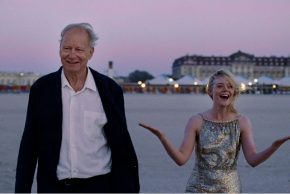Article: Zsuzsanna Deák
Translation: Nóra Fehér
With his matchless smile, his tireless, ever-renewing performances spanning more than half a century, Chick Corea was the music of pure joy. He has been gone since last year, but his legacy is alive and well, and indeed he has left one last gift especially for Hungarian fans. On 14 March, his Concerto for Trio, composed for Müpa Budapest, will be performed at the Béla Bartók National Concert Hall.
Chick Corea was one of the most influential musicians of the last fifty years. He has been compared to Bartók, who wrote a perfect piano piece in no time and then performed it with equal perfection, but he has also composed symphonic works and string quartets, and is best known for his improvisations and jazz standards. The latter, for example, include Spain, 500 Miles High and La Fiesta, which have become a permanent fixture in the jazz repertoire on every continent.
Corea has been nominated for a Grammy Award more than 60 times and has won the award 25 times. But his playing has never lost the introspective, childlike quality that has made it so fresh, honest and engaging.
Born into a Massachusetts family of Southern Italian descent, Corea was christened Armando Anthony, but his aunt often called him ‘cheeky’, and so the nickname Chick stuck. His father led a Dixieland band as a trumpet player, so Corea was constantly surrounded by jazz from infancy. He started playing the piano at the age of four and studied classical music with a pianist named Salvatore Sullo, which had a great influence on his later art. He also tried his hand as a percussionist, an experience that shaped his compositions and his performance. As a high school student, he earned money as a musician, playing with his trio in a jazz club. He also studied at Columbia and at Juilliard, one of the world’s most famous music academies, but university education was not to his taste, so he dropped out and in the early 1960s he threw himself into performing and touring.
From 1968 onwards he played with Miles Davis, recording albums such as Filles de Kilimanjaro, In a Silent Way and Bitches Brew. In 1970 he formed his own group Circle, which developed his own unmistakable style. But he also played solo, and was forever experimenting, trying out atonal music, reaching into the body of the piano and plucking the strings, and improvising with breathtaking abandon. In the early seventies he recorded Piano Improvisations Vol. 1 and Piano Improvisations Vol 2 in the early seventies.
“The concept of communicating with an audience became an important thing for me at that time. When I was younger, I just thought about how much fun it was to play the piano and I didn’t realise that what I was doing was having an impact on other people”
– he said about this period.
Later on, Latin melodies and styles, flamenco and 20th century and contemporary classical music became important to his art, and in the 1970s he and Herbie Hancock performed Bartók pieces, for example. In the nineties he also composed a piano concerto and a piece for symphony orchestra, reworking his earlier work Spain, which was performed by the London Philharmonic Orchestra.
After the turn of the millennium, he continued to give concerts all over the world, visiting Müpa Budapest three times. His amazing energy, thousand-watt baby-boy smile and charismatic personality infused every performance with a radiant joie de vivre.
Chick Corea was scheduled to return to Hungary in November 2021 for his fourth appearance at Müpa Budapest, bringing with him a piece composed at the request of the institution, which was celebrating its 15th birthday shortly before. At the beginning of the year, when everyone was devastated by the news of his death, we had no idea that the composition would be performed in the Budapest concert hall after all. However, it was important for the artist’s widow – singer-pianist Gayle Moran – and her management to bring Corea’s final gift to Budapest.
The piece, written for three pianos, bass and drums, will be premiered by the legendary artist’s friends, fellow musicians and protégés at the concert on 14 March. The bass will be played by John Patitucci from New York, who was a member of three Chick Corea groups in the 1980s and 1990s, but also played with Herbie Hancock, Wayne Shorter and Roy Haynes. Drummer Dave Weckl also grew up with Chick Corea: they played together in the Chick Corea Elektric Band and the Akoustic Band. The three pianists come from three different countries: Georgia’s Beka Gochiashvili and Israel’s Gadi Lehavi, born in 1996, represent the younger generation, but both have experienced playing alongside Chick Corea, and Dániel Szabó, a celebrated jazz pianist and teacher in Hungary and the US, is perhaps the most knowledgeable Hungarian custodian of the master’s legacy. On 14 March, Chick Corea’s joyful music could once again sweep through the building and capture the hearts of the audience.
Article: Zsuzsanna Deák
Translation: Nóra Fehér

























Comments